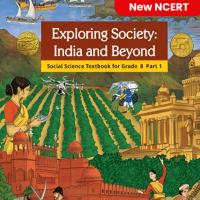Class 8 Exam > Class 8 Questions > how do cow dung and vegetable waste change in...
Start Learning for Free
how do cow dung and vegetable waste change into manure
?Verified Answer
how do cow dung and vegetable waste change into manure Related: NCERT...
The farm waste material like livestock excreta, vegetable waste, domestic waste are decomposed in pits to get highly rich in organic matter, this process is called as compost manure. Here in this process the waste material in pits is broken down by microbes through fermentation or by decomposition and them mixes with soil, it then use to improve soil structure, aeration, soil moisture-holding capacity, and water infiltration.
 This question is part of UPSC exam. View all Class 8 courses
This question is part of UPSC exam. View all Class 8 courses
Most Upvoted Answer
how do cow dung and vegetable waste change into manure Related: NCERT...
How Cow Dung and Vegetable Waste Change into Manure
Cow dung and vegetable waste can be transformed into manure through a natural process called composting. Composting is the decomposition of organic matter by microorganisms, mainly bacteria and fungi, into a nutrient-rich substance known as compost or manure. This process occurs in several stages and involves the breakdown of complex organic compounds into simpler forms.
1. Collection and Preparation
- Cow dung and vegetable waste, such as kitchen scraps, leaves, and grass, are collected and mixed together in a composting pit or bin.
- Larger pieces should be broken down into smaller fragments to speed up the decomposition process.
- The mixture should have a balanced ratio of carbon-rich materials (brown or dry) and nitrogen-rich materials (green or wet) for optimal composting results.
2. Mesophilic Stage
- The initial stage of composting is known as the mesophilic stage, where mesophilic microorganisms start breaking down the organic matter.
- These microorganisms thrive in temperatures around 20-40°C and utilize oxygen for energy.
- During this stage, the pile heats up due to microbial activity, and the decomposition process begins.
3. Thermophilic Stage
- As the temperature rises above 40°C, thermophilic microorganisms become dominant and accelerate the decomposition process.
- Thermophiles can withstand higher temperatures and efficiently break down complex organic compounds.
- The high temperatures during this stage help kill weed seeds, pathogens, and harmful bacteria present in the raw materials.
4. Cooling Stage
- After a few weeks, the compost pile starts to cool down as the availability of organic matter decreases.
- The cooling stage allows mesophilic microorganisms to return and complete the decomposition process.
- The compost pile should be turned or mixed occasionally to provide oxygen and promote even decomposition.
5. Maturation Stage
- The final stage of composting is the maturation stage, where the partially decomposed material matures into a stable and nutrient-rich compost.
- The compost is dark, crumbly, and earthy in texture, indicating that it is ready to be used as manure.
- The maturation process may take a few months to a year, depending on the environmental conditions and the composition of the raw materials.
Benefits of Composting
- Composting helps recycle organic waste and reduces the amount of waste sent to landfills.
- It enriches the soil with essential nutrients, improving its fertility and structure.
- Compost acts as a natural fertilizer, enhancing plant growth and increasing crop yields.
- It improves soil moisture retention and reduces the need for synthetic fertilizers and pesticides.
- Composting also promotes the growth of beneficial microorganisms in the soil, supporting a healthy ecosystem.
In conclusion, cow dung and vegetable waste change into manure through the process of composting. This natural decomposition process involves the activity of various microorganisms, resulting in the conversion of organic matter into nutrient-rich compost. Composting not only helps in waste management but also benefits the environment and promotes sustainable agriculture.
Cow dung and vegetable waste can be transformed into manure through a natural process called composting. Composting is the decomposition of organic matter by microorganisms, mainly bacteria and fungi, into a nutrient-rich substance known as compost or manure. This process occurs in several stages and involves the breakdown of complex organic compounds into simpler forms.
1. Collection and Preparation
- Cow dung and vegetable waste, such as kitchen scraps, leaves, and grass, are collected and mixed together in a composting pit or bin.
- Larger pieces should be broken down into smaller fragments to speed up the decomposition process.
- The mixture should have a balanced ratio of carbon-rich materials (brown or dry) and nitrogen-rich materials (green or wet) for optimal composting results.
2. Mesophilic Stage
- The initial stage of composting is known as the mesophilic stage, where mesophilic microorganisms start breaking down the organic matter.
- These microorganisms thrive in temperatures around 20-40°C and utilize oxygen for energy.
- During this stage, the pile heats up due to microbial activity, and the decomposition process begins.
3. Thermophilic Stage
- As the temperature rises above 40°C, thermophilic microorganisms become dominant and accelerate the decomposition process.
- Thermophiles can withstand higher temperatures and efficiently break down complex organic compounds.
- The high temperatures during this stage help kill weed seeds, pathogens, and harmful bacteria present in the raw materials.
4. Cooling Stage
- After a few weeks, the compost pile starts to cool down as the availability of organic matter decreases.
- The cooling stage allows mesophilic microorganisms to return and complete the decomposition process.
- The compost pile should be turned or mixed occasionally to provide oxygen and promote even decomposition.
5. Maturation Stage
- The final stage of composting is the maturation stage, where the partially decomposed material matures into a stable and nutrient-rich compost.
- The compost is dark, crumbly, and earthy in texture, indicating that it is ready to be used as manure.
- The maturation process may take a few months to a year, depending on the environmental conditions and the composition of the raw materials.
Benefits of Composting
- Composting helps recycle organic waste and reduces the amount of waste sent to landfills.
- It enriches the soil with essential nutrients, improving its fertility and structure.
- Compost acts as a natural fertilizer, enhancing plant growth and increasing crop yields.
- It improves soil moisture retention and reduces the need for synthetic fertilizers and pesticides.
- Composting also promotes the growth of beneficial microorganisms in the soil, supporting a healthy ecosystem.
In conclusion, cow dung and vegetable waste change into manure through the process of composting. This natural decomposition process involves the activity of various microorganisms, resulting in the conversion of organic matter into nutrient-rich compost. Composting not only helps in waste management but also benefits the environment and promotes sustainable agriculture.

|
Explore Courses for Class 8 exam
|

|
Question Description
how do cow dung and vegetable waste change into manure Related: NCERT Solution - Micro-Organisms : Friend or Foe? for Class 8 2025 is part of Class 8 preparation. The Question and answers have been prepared according to the Class 8 exam syllabus. Information about how do cow dung and vegetable waste change into manure Related: NCERT Solution - Micro-Organisms : Friend or Foe? covers all topics & solutions for Class 8 2025 Exam. Find important definitions, questions, meanings, examples, exercises and tests below for how do cow dung and vegetable waste change into manure Related: NCERT Solution - Micro-Organisms : Friend or Foe?.
how do cow dung and vegetable waste change into manure Related: NCERT Solution - Micro-Organisms : Friend or Foe? for Class 8 2025 is part of Class 8 preparation. The Question and answers have been prepared according to the Class 8 exam syllabus. Information about how do cow dung and vegetable waste change into manure Related: NCERT Solution - Micro-Organisms : Friend or Foe? covers all topics & solutions for Class 8 2025 Exam. Find important definitions, questions, meanings, examples, exercises and tests below for how do cow dung and vegetable waste change into manure Related: NCERT Solution - Micro-Organisms : Friend or Foe?.
Solutions for how do cow dung and vegetable waste change into manure Related: NCERT Solution - Micro-Organisms : Friend or Foe? in English & in Hindi are available as part of our courses for Class 8.
Download more important topics, notes, lectures and mock test series for Class 8 Exam by signing up for free.
Here you can find the meaning of how do cow dung and vegetable waste change into manure Related: NCERT Solution - Micro-Organisms : Friend or Foe? defined & explained in the simplest way possible. Besides giving the explanation of
how do cow dung and vegetable waste change into manure Related: NCERT Solution - Micro-Organisms : Friend or Foe?, a detailed solution for how do cow dung and vegetable waste change into manure Related: NCERT Solution - Micro-Organisms : Friend or Foe? has been provided alongside types of how do cow dung and vegetable waste change into manure Related: NCERT Solution - Micro-Organisms : Friend or Foe? theory, EduRev gives you an
ample number of questions to practice how do cow dung and vegetable waste change into manure Related: NCERT Solution - Micro-Organisms : Friend or Foe? tests, examples and also practice Class 8 tests.

|
Explore Courses for Class 8 exam
|

|
Signup for Free!
Signup to see your scores go up within 7 days! Learn & Practice with 1000+ FREE Notes, Videos & Tests.























